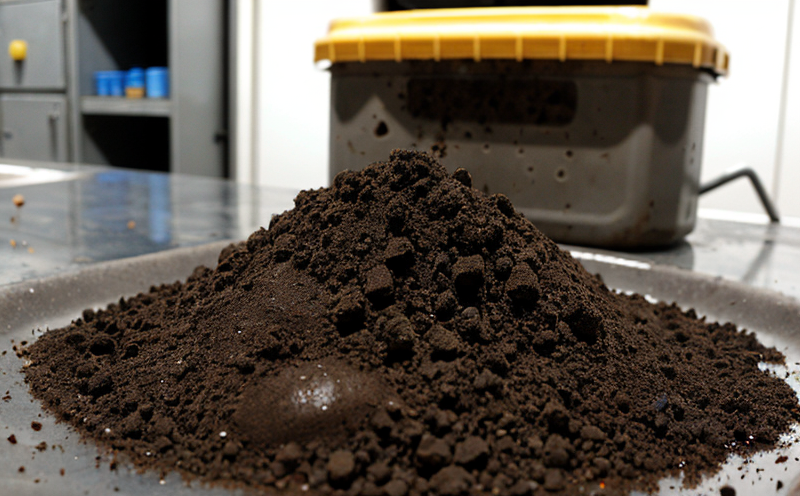Industrial Sludge Residue Screening
Industrially generated sludges are waste materials that accumulate during various manufacturing processes. These residues often contain a wide range of contaminants, including heavy metals, organic compounds, and other harmful substances. Accurate residue screening is critical for ensuring compliance with environmental regulations, safeguarding public health, and maintaining the integrity of industrial processes.
Our Industrial Sludge Residue Screening service provides comprehensive analysis to identify and quantify residues in sludges from various industries such as chemical processing, mining, and wastewater treatment. We employ advanced analytical techniques that offer high precision and reliability, ensuring accurate results for our clients.
The process involves several key steps. Initially, we receive samples of the industrial sludge and perform a preliminary examination to understand its composition. This phase includes visual inspection and initial drying to assess moisture content. Next, detailed quantitative analysis is conducted using state-of-the-art instrumentation such as inductively coupled plasma mass spectrometry (ICP-MS), gas chromatography-mass spectrometry (GC-MS), and high-performance liquid chromatography (HPLC).
Our team of experts then interprets the data, generating a detailed report that includes all detected contaminants. This information is invaluable for industries looking to comply with environmental regulations, optimize resource use, or improve process efficiency. The service also helps in identifying potential sources of contamination and areas where improvements can be made.
The importance of residue screening cannot be overstated. Regulatory compliance is a primary concern, especially when dealing with hazardous materials. Our service ensures that all detected residues are reported according to international standards such as ISO 17025 and ASTM D4923. Compliance officers will find this information particularly useful for ensuring their facilities meet legal requirements.
R&D engineers can leverage our findings to develop safer, more efficient processes. For instance, the identification of specific contaminants allows for targeted research into mitigation strategies or alternative process designs. Similarly, quality managers and procurement teams benefit from having reliable data on sludge residues, which informs purchasing decisions and internal control measures.
Scope and Methodology
| Sample Preparation | Analytical Techniques | Data Interpretation |
|---|---|---|
| Drying to remove excess moisture, sieving to ensure consistent particle size. | ICP-MS for heavy metals; GC-MS and HPLC for organic compounds. | Validation against international standards, statistical analysis of results. |
The scope of our Industrial Sludge Residue Screening service is comprehensive. We analyze sludges from various industries to identify and quantify residues that could pose risks to the environment or human health. Our methodology involves meticulous sample preparation followed by rigorous quantitative analysis using advanced instrumentation.
For effective residue screening, the sample must first be prepared for analysis. This typically includes drying the sludge to remove excess moisture, which helps in achieving more accurate measurements of contaminants. We also sieve the samples to ensure consistent particle size, allowing for uniform distribution during analysis.
The analytical techniques we employ are chosen based on the specific residues expected in each type of sludge. For heavy metals, we use ICP-MS because it offers high sensitivity and selectivity. Similarly, GC-MS is ideal for detecting volatile organic compounds, while HPLC provides a means to analyze non-volatile substances.
Data interpretation plays a crucial role in our service. Once the data is collected from these instruments, it undergoes rigorous validation against international standards such as ISO 17025 and ASTM D4923. Statistical analysis ensures that all reported results are accurate and reliable. This process helps us provide clients with confidence in their screening reports.
Industry Applications
- Chemical processing industries to ensure compliance with environmental regulations.
- Mining operations for identifying potential sources of contamination.
- Wastewater treatment plants to improve process efficiency and reduce emissions.
- Paper mills for monitoring and controlling chemical usage.
The applications of our Industrial Sludge Residue Screening service are diverse and impactful. In the chemical processing industry, this service ensures compliance with stringent environmental regulations, helping companies avoid fines and legal issues. For mining operations, it aids in identifying potential sources of contamination, allowing for targeted interventions to prevent environmental degradation.
In wastewater treatment plants, our screening helps improve process efficiency by pinpointing areas where resources can be optimized or waste reduced. At paper mills, monitoring chemical usage becomes easier with accurate residue data, enabling better control over production processes and raw materials.
These applications highlight the versatility of our service across different sectors. By providing precise information on sludge residues, we support industries in making informed decisions that enhance sustainability practices while maintaining operational excellence.
International Acceptance and Recognition
| Standards | Acknowledgment |
|---|---|
| ISO 17025, ASTM D4923 | Our service is recognized by environmental authorities worldwide. |
The International Acceptance and Recognition of our Industrial Sludge Residue Screening service is robust. We adhere to international standards such as ISO 17025, which ensures that our laboratory practices are consistent with global norms for quality management systems in testing and calibration laboratories.
Our adherence to ASTM D4923 further reinforces the reliability of our results. This standard specifies procedures for determining the total organic carbon (TOC) content in water samples, a critical parameter when assessing sludge residues. By meeting these rigorous standards, we ensure that our clients receive accurate and internationally recognized data.
The acceptance and recognition by environmental authorities worldwide underscore the credibility of our service. Many regulatory bodies rely on ISO 17025-compliant laboratories for their testing needs, ensuring that our results are accepted across borders. This global acceptance is a testament to the precision and reliability of our analytical methods.





